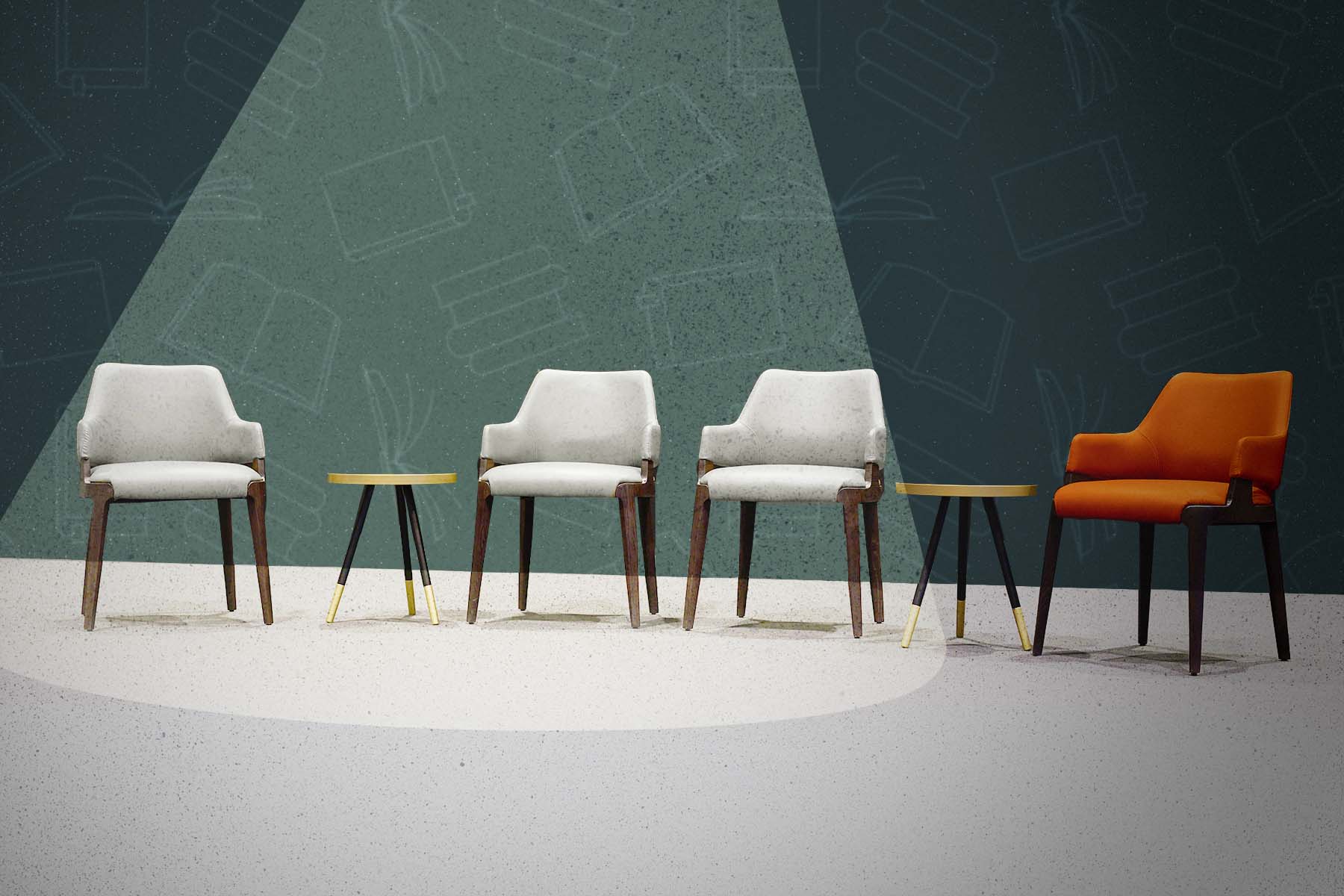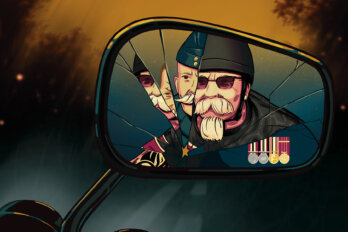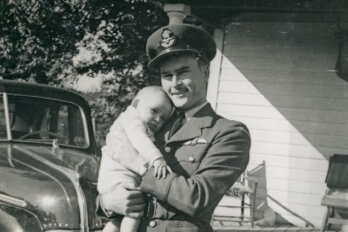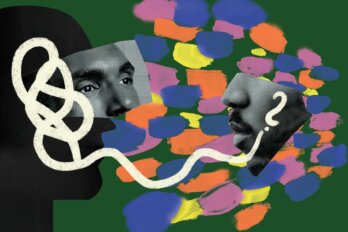Istand at the counter watching steam rise as water descends over the jagged bits of ginger below. The mug is too hot to hold, so I wrap my fingers around the handle and carry it over to our grey couch. My first book, a memoir, has just been released, and I feel like I’ve finally finished a long trek up the mountain. Suddenly I hear cries of what must be a wild animal, only to quickly realize it’s my own voice, harsh and primal. I feel something trapped deep in my right upper leg and vagina, a bear’s fangs sunk deep into layers of skin. There is nowhere to escape the aftermath of boiling water.
“Are you sure you still want to travel tomorrow?” Shakil, my husband, asks a short time later. He’s done his best to support me as I sit doubled over at the dining table, tears dripping into silence. I survey the enormity of the trembling raw skin now covering most of my upper thighs.
“No choice,” I grind out the words. “More pills. And the other ice pack.”
The next day, I am embarking on two months of almost continuous travel to twelve North American cities, with sometimes two or more events per day, for Breaking the Ocean: Race, Rebellion, and Reconciliation, my story about integrating the lifelong impacts of exile, immigration, racism, and trauma. I have written about obsessive-compulsive behaviour and bulimia, debilitating migraines and chronic depression. When I was in the writing process, I thought I was ready to revisit the past and speak about it, but I didn’t yet realize that telling the story meant the courage to relive it. I’ve since learned this is often how healing occurs: present-day injuries triggering echoes of past hurts, an unasked-for, often unwelcome, do-over.
One of the first destinations is Ottawa, a place where I once briefly lived in my mid-twenties. I have been invited to speak at an event (unpaid) at the National Gallery of Canada on the topic of “living well.” I deliver a speech covering systemic racism and its manifestations in a packed auditorium. The topic is belonging and how often it’s the small things that undermine our feeling of being welcomed: micro exclusions such as names being shortened, mispronounced, or even laughed at. I finish this section by saying, “These unintentional exclusions are as painful as the more overt forms of discrimination, more so in some ways because they are both ubiquitous and invisible. The bleeding is internal, the emotional labour determining whether to interrupt or to swallow. Either way, there is risk involved.”
This is my coming out as an author, and it matters to me that I’m represented as authentically as possible. Still, when the host organization’s director comes on stage at the end to thank us presenters, she tries, stutters, and proceeds to grossly mispronounce my name. There are only six of us to thank. What she’s enacting, the fact she has not bothered to get the one word right while I have memorized a speech of over a thousand words to support her event, is not just a one off. It’s a goddamn pattern.
I’m conveniently seated in the front row, and so I call up to correct her. She pauses awkwardly but seems unable to stop, apologize, and simply check or correct herself. I hear my own voice fading away in the silence of the auditorium. No one sitting on either side of me risks looking my way. It is contravening deeply entrenched WASP norms to speak out loudly, to interrupt someone (especially on stage), to demand respect. I can feel myself shrink inside, the dull throbbing of my leg echoing throughout my whole body.
Afterward, lost in the sea of white donors, I go over to visit the book table and realize the one request I had made of the organization—to have copies of my book on hand to sell—has been overlooked or forgotten. They do, however, have a book about a white man and his favourite tree, making me momentarily regret that I did not turn out to be a birder or hadn’t hiked 10,000 kilometres on the Pacific Crest Trail (white people in nature never fails to sell). A staff person approaches me and abashedly whispers, “The director asked me to come and apologize to you.” I look over and see this director nearby, an older woman with blond bobbed hair, drink in hand, talking to an older male donor. “Oh,” I respond, wondering what prevents her from closing the two-metre gap between us to apologize to me herself. Suddenly, it’s all too much. My eyes fill with tears, and I pivot away, feeling the weight of too many indignities piled on top of my own vulnerability in this space. Back in the hotel room, I carefully unwrap layers of gauze, clean the burn wound, reapply all the bandages, and lie down to order in food. I’m unsure how I’m going to emotionally survive the rest of this journey while also being aware of how privileged I am to be here at all.
Afew days later, I arrive in Vancouver for a prominent writers’ festival. After checking into the hotel, I decide to venture into the authors’ lounge to see if I can connect with some other writers. I go over and introduce myself to the festival director, but she cuts our conversation short and takes me over to introduce me to the only other person of colour in the room. We look at each other awkwardly, both of us implicitly acknowledging the POC ghetto we’ve just been relegated to.
After my last event at this festival two days later, I enter the same lounge for a cup of mint tea. An older white woman comes over to me. “I enjoyed your panel,” she says. “You and the other presenter”—another Brown woman of a different racial/cultural background—“with your brown curly hair looked like you could be cousins. You were both so cute!” I have no words with which to respond. Perhaps, I think, I should lower my head so she can actually pat it. Back in the hotel room, as I change the bandages on my wound, I can see that the skin down to my knee is getting infected. I hunt down and visit a medical centre the next day.
“Take these antibiotics,” the white doctor instructs as he hands over the script. “How do I look after the wound?” I ask. “I’m worried about it getting worse.” He looks at me for a moment. “Don’t worry about it,” he snaps. Here, again, is the echo of so many moments picking at the scab on childhood wounds where people in authority—doctors, teachers, camp counsellors, and Girl Guide leaders—were collectively unable or unwilling to hear or address the only question my childhood self was holding on to: Will this get better? This question scrabbles about in my chest cavity like the pressure of a small mouse colony, demanding release. I say nothing but silently hear the boomerang of my own words from earlier on this trip: “The bleeding is internal, the emotional labour determining whether to interrupt or to swallow. Either way, there is risk involved.”
The antibiotics help, but the wound stays red and inflamed. After a stop in the US, I fly back to Edmonton, my adopted city after fleeing Iran. This was the one place I was mentally crossing fingers would not be added to my itinerary. I reluctantly said yes when the invitation arrived, because it felt destined that in talking about my past, I would be invited to confront it. After landing in the airport, I hobble over to the customs line and scramble around in my purse to find passport and ID. I am physically exhausted and feel emotionally raw. It’s hard to differentiate between forty-six-year-old and nine-year-old me right now.
I look over to see who the customs official is—a white woman with a head of red hair to her shoulders—fully expecting a third-level inquisition about place of birth and purpose of travelling to the US. Instead, she takes a moment to smile at me before looking down. “How do I pronounce your name?” she asks. I feel a small spark ignite in my chest as I tell her. After carefully checking my documents, she hands them back with a bigger smile, shocking me with what comes next: “Welcome home.”
This exchange sets off another echo of the past, and I realize that perhaps old wounds of rejection and fear of rejection are being touched so that I can squeeze out any lingering pus of shame. Maybe I will be able to more deeply appreciate the ways in which this city and this country were both a landing place and a home. Happiness often coexists with abuse. No human experience is monolithic, and my time after immigrating here also held generosity, support, and good people. I smile back at the attendant and whisper, “Thank you,” my eyes filling as I fumble forward.
Speaking in Edmonton is a magnification of all the emotions. The bear jaws in my leg sink deeper, while the mice in my chest scurry faster. My first event is in a large downtown mall. I assume the interview is going to be broadcast from the local radio station, but I find out there is no recording and this will instead be a live conversation to be held in the two chairs set up at the entrance of the local news studio facing the open mall. I meet my interviewer, a young white woman, and a few minutes later, as we are seated in front of our tiny audience, she lobs the opening question toward me. “You write about the trauma of moving here to Canada”—there is a burst of background noise as a group of people enter through the mall doors—“CAN YOU TELL US WHAT IT WAS LIKE FOR YOU AS A CHILD BEING SPAT ON AND GOING TO THE BATHROOM MULTIPLE TIMES EACH NIGHT?”
I pause to let the background cacophony die down so I can hear my own voice responding. This question, in this environment, is like being thrown into the freezing ocean in the middle of a storm. Do I launch into years of being told I smelled, of being called racial slurs, or of being shunned so severely that even momentary eye contact could make my whole day? How do I unravel years of social rejection, chapters in the book, into words that my body and this random group of strangers can hold? I realize that this flailing around, trying to grab on to the right words as a lifesaver, is how I’ve always felt in this place.
That evening, as part of another festival event, I’m on stage between an older white female author and an Indigenous writer. The white woman answers in spurts of minutes, while the other author and I try and squeeze between and around her long-winded responses. At the signing table immediately afterward, there is a lineup of people to buy books. I’m grateful—that’s the point of all this. The first person comes up and says, “It sounds like you had a hard childhood, but you must be glad it happened, because you’re here.” Another one comments, “Canada is a great place to move to, don’t you think?” I realize that I have to make peace with white people’s discomfort with the content of my book. Either I’m the hero or victim, pain-free or in need of rescuing, all designed to make the witness feel better. This is the legacy of discrimination—you never get to choose who you are, and the choices are usually a dehumanizing dichotomy, with no room in between for the nuances of personhood. These people aren’t aware that they hold positions of identity privilege. They dictate the culture, and whiteness as a culture is suffocating.
The next morning, I visit yet another medical centre. The doctor vigorously pulls away the bandages protecting the injured area. I look at my leg spread out like a skinned animal carcass awaiting dissection. He turns away and barks, “You need to come in every day to get this taken care of!” I feel like he is blaming me for the burn. The nurse proceeds to scrub all the remaining bits of dead skin from the wound as I suck in my breath. “Debridement,” the nurse says, apropos of nothing. In response to my questioning look, she expands, “It means cleaning the wound of all foreign objects.”
A week later, after returning home to Toronto in between travels, I get a last-minute call to attend a prestigious literary event at the Four Seasons Hotel in the upscale Yorkville neighbourhood. I’m running on fumes at this point after back-to-back events educating mostly white audiences about the reality of racism. There is one author to be placed at each event sponsor’s table with twelve other people who each pay over $1,000 to attend. I tell the event’s organizer that I’m hesitant about spending the night surrounded by rich white people who have no connection to my book. I don’t know if I have it in me to parlay concepts like race, immigration, and exile into light dinner conversation. I hear his voice in my ear assuring me that I will be well taken care of.
I find myself later that evening in a fancy cream-and-gold ballroom. The meal passes while prizes are handed out on stage by white people to mostly other white people, although there are banners of diverse authors hovering behind the stage like ghosts. I and the other racialized writers I can see scattered at tables around the room are present but unseen. We are wooed for the colour we represent, but we don’t yet belong.
I overhear an announcement from the stage about the next association president newly coming into the position, and to my surprise, it is an older white man who comes to the microphone. Is this really happening? Every single literary association, almost every writers’ festival, and most publishing houses in this country are still led by white people born and raised in Canada, and despite the best of efforts, if you’re here, you’d better know how to use the salad fork. There is no hand eating, floor seating, or kids running amok in spaces like these. White culture is the perfectionism of skin and bone hidden behind polite masks and polished with emotionally neutral conversation. I have to straitjacket so much of myself to be here, and I am tired of playing the role of grateful author.
As the evening formalities wind down and the others at my table start drifting off, I remain seated amid the white tablecloths and elaborate flower bouquets. I think about how writing my story in the form of a book and putting it out into the world is like removing layers of skin. No surprise that I burned myself. Was it worth it? I wonder. I think about the way racism—and scalding water—have permanently marked me, but telling my story has resurrected me and guided me forward. If immigrating to Canada was the original burn, shame became the foreign object.
A sense of home is often messy and it can be complicated, but home is also where we choose to settle down for the struggle and lick our wounds before showing up to start anew the next day, to continue the story or to write a new beginning. In the cab at the end of the night, I think back to my last medical visit in Toronto a few days earlier. As I lay on the white operating surface, the doctor peered over my leg with the care of a midwife mid-delivery, gingerly prodding the delicate skin. I hear her voice echo in my ear softly. “It’s certainly healing.” I let out a breath I didn’t know I’d been holding, to hear her add, “Slowly.”
Excerpt from Bones of Belonging: Finding Wholeness in a White World by Annahid Dashtgard. Published by Dundurn Press. Copyright 2023 by Annahid Dashtgard. Reprinted with permission.






